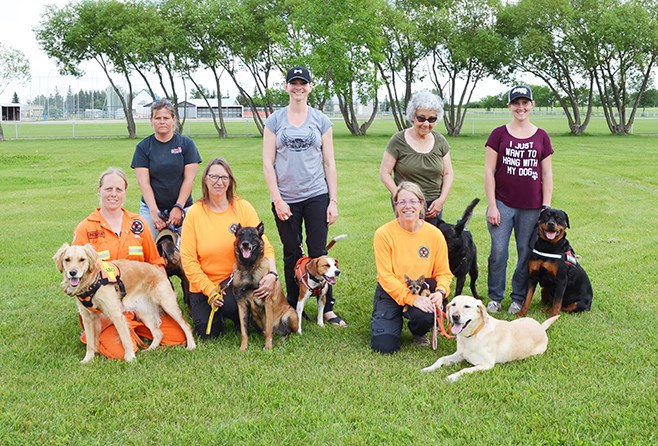┬Ā ┬Ā ┬Ā ┬Ā ┬ĀHave you ever had the fear of being lost in the wilderness, buried in an avalanche and scared out of your mind and wonder if anyone will ever find youŌĆ”ALIVE? If you know anything about a rescue dog, you can be assured that a K-9 Search and Rescue team gives you a better chance of being found.
┬Ā┬Ā┬Ā┬Ā┬Ā┬Ā┬Ā┬Ā Traci Anderson of Kipling is a dog owner who is hoping to start a K-9 Search and Rescue group with people from all over Saskatchewan who all have the same goal in mind. ThatŌĆÖs to start a Chapter for SAR in Saskatchewan.
┬Ā┬Ā┬Ā┬Ā┬Ā┬Ā┬Ā┬Ā ŌĆ£In order to have a chapter for SAR in Saskatchewan we have to have at least 6 members,ŌĆØ Anderson explains. ŌĆ£Some of us had previously taken courses in training dogs but one of the requirements is all members have to have taken a seminar.ŌĆØ
┬Ā┬Ā┬Ā┬Ā┬Ā┬Ā┬Ā┬Ā Anderson contacted Canadian Search & Disaster Dogs Association to lead a seminar in Kipling in order to get dog owners interested in establishing a Search and Rescue team in Saskatchewan.
┬Ā┬Ā┬Ā┬Ā┬Ā┬Ā┬Ā┬Ā Silvie Montier, Training Coordinator & IRO Certified International K-9 Team Leader, and two experienced Handlers led a seminar over this past weekend in Kipling with five members taking part in learning how to start the training of their dogs. Over the course of the two and a half days the leaders with the help of their certified dogs demonstrated the basic exercises to ŌĆśshow them how itŌĆÖs doneŌĆÖ.
┬Ā┬Ā┬Ā┬Ā┬Ā┬Ā┬Ā┬Ā ItŌĆÖs not just the dogs that need training. Their owners need to learn how to work with their dogs as well.
┬Ā┬Ā┬Ā┬Ā┬Ā┬Ā┬Ā┬Ā The handler has to learn and understand how to direct the dog in a search.
┬Ā┬Ā┬Ā┬Ā┬Ā┬Ā┬Ā┬Ā Suitable dogs tend to be a herder such as a border collie, a hunter such as a springer spaniel or retriever (Labs and Golden Retrievers), a worker dog such as German Shepherd or Malinois. So long as the dog has a good temperament and is a dog that loves to fetch or loves to tug, these are easier to train for a search dog and one thatŌĆÖs not shy or scared of people.
┬Ā┬Ā┬Ā┬Ā┬Ā┬Ā┬Ā┬Ā In order to act as professionals a handler/volunteer must train like professionals. They must be dedicated, reliable, disciplined, have freedom to be able to go.
How do you take a pet or a puppy to a working dog? Montier says ŌĆ£ItŌĆÖs all about air scenting.ŌĆØ
┬Ā┬Ā┬Ā┬Ā┬Ā┬Ā┬Ā┬Ā Part of the training involves teaching your dog three things:
- Nose work - to find the source of the scent
- Alert the owner theyŌĆÖve found something (barks)
- Searching - putting it all together.
┬Ā┬Ā┬Ā┬Ā┬Ā┬Ā┬Ā┬Ā During the search training owners were taught to attach the dog to the toy/food or the reward, attach the toy to the victim and last but not least attach the dog to the victim.
┬Ā┬Ā┬Ā┬Ā┬Ā┬Ā┬Ā┬Ā During the training you need to change your attitude and change your dogŌĆÖs attitude.
┬Ā┬Ā┬Ā┬Ā┬Ā┬Ā┬Ā┬Ā Changing your mentality is the most difficult part of training a SAR dog.
┬Ā┬Ā┬Ā┬Ā┬Ā┬Ā┬Ā┬Ā ŌĆ£During the initial training you are a post!ŌĆØ explains Montier ŌĆ£No interfering with your dog. Your dog is not your pet; itŌĆÖs your partner.ŌĆØ
┬Ā┬Ā┬Ā┬Ā┬Ā┬Ā┬Ā┬Ā ŌĆ£You have to respect your dog and your dog will respect you,ŌĆØ Montier comments. While working, you have to allow your dog to see the Victim as more important than you are.
┬Ā┬Ā┬Ā┬Ā┬Ā┬Ā┬Ā┬Ā Change your dogŌĆÖs attitude. You want a willful dog, a dog who is a problem solver, an agile dog, a courageous dog, and an independent dog.
┬Ā┬Ā┬Ā┬Ā┬Ā┬Ā┬Ā┬Ā Training leads to testing. Under Canadian Search & Disaster Dogs Association, once a dog and its owner have completed the basics they will train for approximately two years. Then itŌĆÖs time to test them to see if theyŌĆÖre both ready to be operational on the SAR team.
┬Ā┬Ā┬Ā┬Ā┬Ā┬Ā┬Ā┬Ā And it all starts here ŌĆ£So they can liveŌĆ”ŌĆØ
┬Ā┬Ā┬Ā┬Ā┬Ā┬Ā┬Ā┬Ā ŌĆ£Over all it was a great weekend with lots of learning, as well as laughter. It was a great opportunity for K-9 people to get together and do what they enjoy the most.....train,ŌĆØ comments Anderson of her experience at this seminar.
┬Ā┬Ā┬Ā┬Ā┬Ā┬Ā┬Ā┬Ā ŌĆ£It was the first chapter in our book, to a K-9 program in Saskatchewan. ItŌĆÖs a start, and we look forward to being able to move forward. We are in the process of planning some training weekends very soon, and looking forward to another great weekend of training and friendship!ŌĆØ adds Anderson.
┬Ā┬Ā┬Ā┬Ā┬Ā┬Ā┬Ā┬Ā If you are interested in becoming a member of this group or would like to know more information please give Traci Anderson a call at 471-1998.
┬Ā┬Ā┬Ā┬Ā┬Ā┬Ā┬Ā┬Ā┬Ā┬Ā┬Ā┬Ā┬Ā┬Ā┬Ā┬Ā┬Ā The members of Canadian Search & Disaster DogŌĆÖs Association would like to thank the community of Kipling for their warm welcome and support in making this seminar possible.




